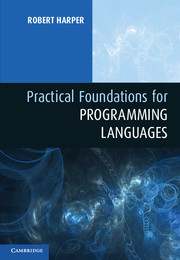Book contents
- Frontmatter
- Contents
- Preface
- Part I Judgments and Rules
- Part II Statics and Dynamics
- 4 Statics
- 5 Dynamics
- 6 Type Safety
- 7 Evaluation Dynamics
- Part III Function Types
- Part IV Finite Data Types
- Part V Infinite Data Types
- Part VI Dynamic Types
- Part VII Variable Types
- Part VIII Subtyping
- Part IX Classes and Methods
- Part X Exceptions and Continuations
- Part XI Types and Propositions
- Part XII Symbols
- Part XIII State
- Part XIV Laziness
- Part XV Parallelism
- Part XVI Concurrency
- Part XVII Modularity
- Part XVIII Equational Reasoning
- Part XIX Appendix
- Bibliography
- Index
4 - Statics
from Part II - Statics and Dynamics
Published online by Cambridge University Press: 05 February 2013
- Frontmatter
- Contents
- Preface
- Part I Judgments and Rules
- Part II Statics and Dynamics
- 4 Statics
- 5 Dynamics
- 6 Type Safety
- 7 Evaluation Dynamics
- Part III Function Types
- Part IV Finite Data Types
- Part V Infinite Data Types
- Part VI Dynamic Types
- Part VII Variable Types
- Part VIII Subtyping
- Part IX Classes and Methods
- Part X Exceptions and Continuations
- Part XI Types and Propositions
- Part XII Symbols
- Part XIII State
- Part XIV Laziness
- Part XV Parallelism
- Part XVI Concurrency
- Part XVII Modularity
- Part XVIII Equational Reasoning
- Part XIX Appendix
- Bibliography
- Index
Summary
Most programming languages exhibit a phase distinction between the static and dynamic phases of processing. The static phase consists of parsing and type checking to ensure that the program is well-formed; the dynamic phase consists of execution of well-formed programs. A language is said to be safe exactly when well-formed programs are well-behaved when executed.
The static phase is specified by a statics comprising a collection of rules for deriving typing judgments stating that an expression is well-formed of a certain type. Types mediate the interaction between the constituent parts of a program by “predicting” some aspects of the execution behavior of the parts so that we may ensure they fit together properly at run time. Type safety tells us that these predictions are accurate; if not, the statics is considered to be improperly defined, and the language is deemed unsafe for execution.
This chapter presents the statics of the language ℒ{num str} as an illustration of the methodology that we employ throughout this book.
Syntax
When defining a language we are primarily concerned with its abstract syntax, specified by a collection of operators and their arities. The abstract syntax provides a systematic, unambiguous account of the hierarchical and binding structure of the language and is therefore to be considered the official presentation of the language. However, for the sake of clarity, it is also useful to specify minimal concrete syntax conventions without going through the trouble to set up a fully precise grammar for it.
- Type
- Chapter
- Information
- Practical Foundations for Programming Languages , pp. 31 - 35Publisher: Cambridge University PressPrint publication year: 2012



